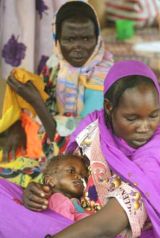UN: Almost a quarter of Darfur’s children malnourished, more aid needed
By SAM CAGE, Associated Press Writer
GENEVA, Oct 26, 2004 (AP) — Almost a quarter of children under five years of age in Sudan’s conflict-ravaged Darfur region are malnourished and more help will be needed because the harvest is expected to fail, the United Nations food agency said Tuesday.

|
|
Sudanese women hold their malnourished children. |
The number of children suffering from malnutrition in Darfur — 22 percent — is well above the 15 percent which aid workers count as a “serious situation,” said Rita Bhatia, an expert from the World Food Program.
Almost half of all families in the region do not have enough food “to sustain an active and healthy lifestyle,” the WFP said.
“The situation is very precarious,” said Bhatia, who returned recently from a mission to the western Sudanese region. “Humanitarian assistance is going to be required for some time and needs to be increased.”
The Darfur conflict has killed 70,000 people since March and forced an estimated 1.5 million villagers from their homes, the United Nations said recently. More than 200,000 of those have crossed to neighboring Chad, where tension has risen because resources to care for the refugees are scarce.
The United Nations and aid groups have called Darfur the world’s worst humanitarian crisis. Sudan’s government is accused of using Arab militias — known as Janjaweed — to put down a 19-month rebellion by non-Arab African groups.
Farmers who fled have been unable to till their fields. Those who have stayed in their villages have faced attacks when they try to work the land.
Releasing the findings of WFP’s mission, agency official Wolfgang Herbinger said that “by next year, with this expected poor harvest, more people will need assistance.”
WFP surveyed more than 5,000 people across Darfur in August and September. The agency has now received more than 80 percent of the US$204 million (A?159 million) it appealed for to fund its operations in Darfur until the end of this year.
“The situation is better but it’s still not under control,” Bhatia told reporters.
Simply increasing food aid will not solve the problem, the agency said. The people of Darfur also need more clean water and medicine.
There are now more than 5,000 humanitarian workers in Darfur and this has made a significant difference to the plight of the population, WFP said.
“While much has been done for months now to feed as many people as possible in Darfur, the survey underlines how much remains to be done,” WFP’s Sudan chief Ramiro Lopes da Silva said in a statement.
WFP said it fed more than 1.3 million people in Darfur in September, while the international Red Cross helped 100,000 others in areas which the United Nations had rated “no go” for its staff.
WFP recently called a temporary halt to its operations in parts of Darfur after two staff members of the British aid group Save the Children UK were killed in an explosion believed caused by a land mine or unexploded ordnance.
_
On the Net:
World Food Program, http://www.wfp.org
